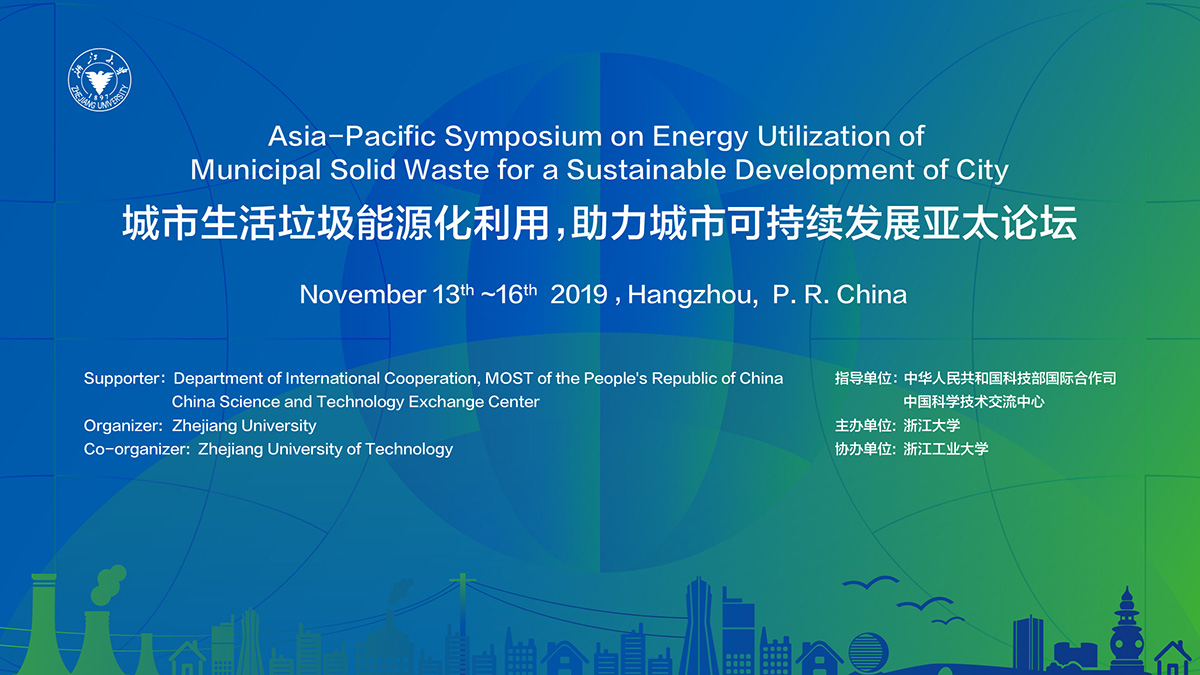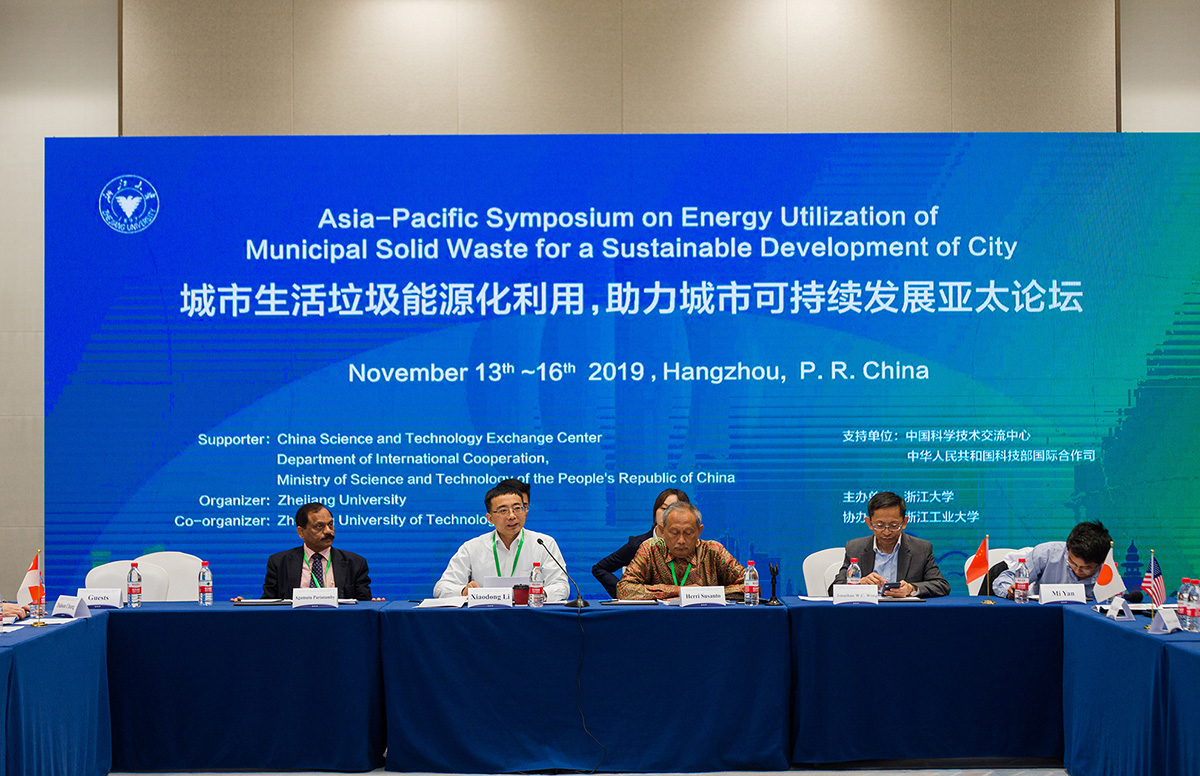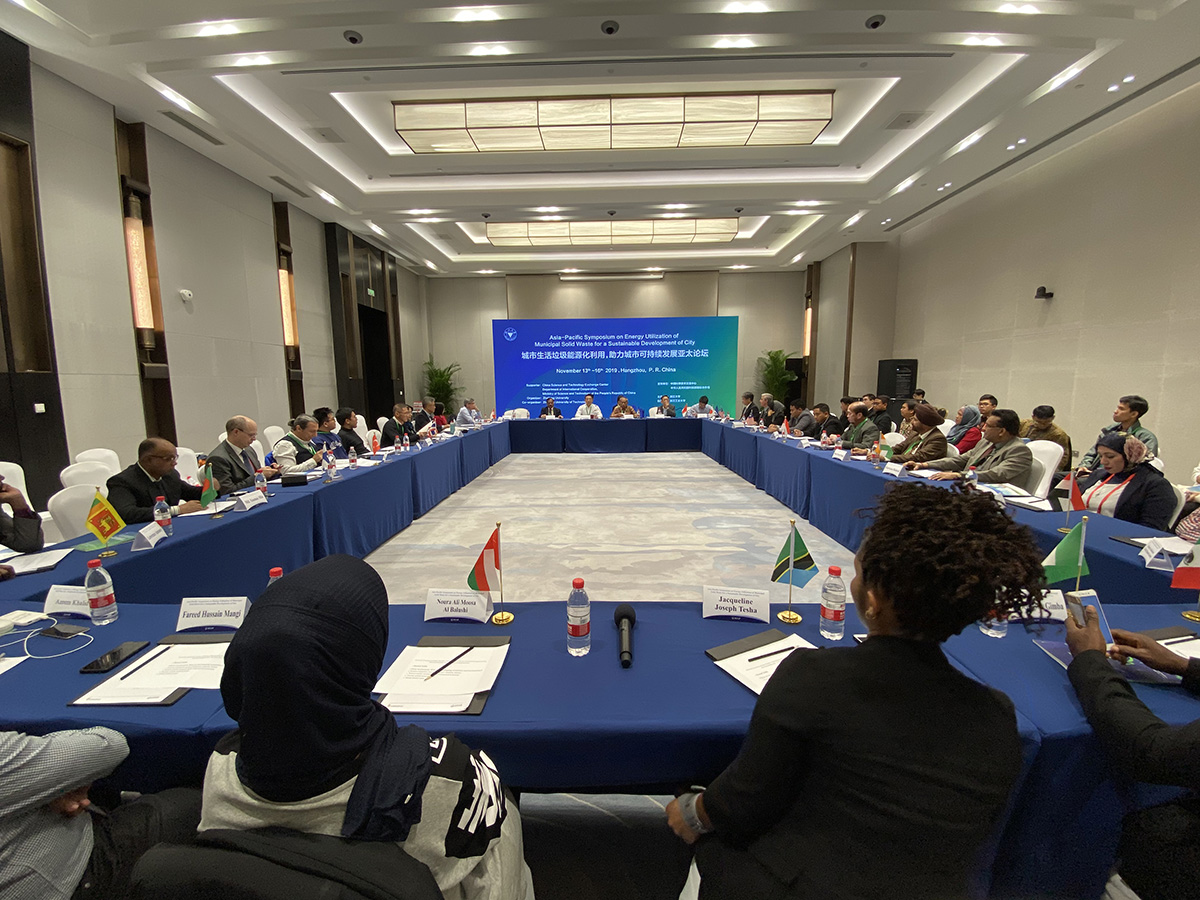Asia Symposium
The Asia-Pacific Symposium on Energy Utilization of Municipal Solid Waste for a Sustainable Development of City (hereinafter referred to as the Symposium) had been held between November 13th and 16th, 2019, in Hangzhou, China. The Symposium was supported by Ministry of Science and Technology of the People’s Republic of China and China Science and Technology Exchange Center, which was organized by Zhejiang university and Zhejiang University of technology.The Symposium aims at strengthening the communication of technical experts, industry personnel and government officials in the field of Waste to Energy (WtE) among the AsiaPacific Economic Cooperation (APEC) economies and "One Belt One Road" countries. Development and application of advanced WtE technologies is an effective solution towards the serious problem of "garbage siege". With the help of China's 30-year experience in management of municipal solid waste, the Symposium is expected to promote the market application of WtE technologies among the APEC economies and "One Belt One Road" countries, ensuring a sustainable development of city and economy.



There were 20 speeches by speakers from 15 different countries, mainly two individual sessions were set for discussion and communication: (1) advanced technologies and practices of WtE, and (2) development of municipal solid waste management and energy utilization market in Asia-Pacific economies. The following is a detailed introduction to the relevant reports:
Engineering Approach for WtE Applications
1. Introduction of WtE technology and engineering approach
2. Engineering Practice for WtE Applications
3. Cases of Engineering Research
An overview on the implementation of community based MSW management in Bandung
- A conceptual design of small self-supporting MSW treatment
1. Fact of municipal solid waste in Bandung
2. Preference treatment of MSW in Bandung
3. Communal Waste Management
Enhanced H2-rich gas production from pyrolysis of waste biomass using Ni-based bi-functional materials
1. The current status of organic solid waste management
2. The development and application of pyrolysis/ gasification
3. The basic research on tar removal with Ni-based bi-functional materials
Waste to Energy Potential in Karachi, The City of the Lights, Pakistan
1. To know about waste management situation in Karachi, The Largest City of Pakistan
2. The Challenges to overcome the SWM issue
3. The SWM Situation and Waste to Energy Potential in Karachi.
Ignored waste to energy - Efforts required in Developing Economies
1. Food waste
2. Medicinal plants/parts waste
3. Weeds waste
Towards a Zero Waste Singapore
1. Singapore’s Solid Waste Management System
2. Singapore’s solid waste management strategies
3. Challenges – Waste Growth, Land Scarcity, Climate Change
4. A Sustainable, Resource-efficient and Climate-resilient Singapore
Waste to Energy: Opportunities and Obstacles to Project Development in Regional Area of Thailand
1. Overview of Municipal Solid Waste in Thailand:
1) Municipal Solid Waste (MSW) Situation
2) National Policy on Waste Management
3) Waste to Energy Approach
4) Area Cluster Approach
2. Waste to Energy in Thailand
1) Current Energy Consumption
2) WtE Technologies
3) Opportunities & Incentives
4) Challenges & Obstacles
Potential of Agricultural Residues and Underutilized Plants for Conversion to Biofuel and Bioproducts in Malaysia
1. Solid Waste in Malaysia
2. Introduction of Biodiesel
3. Palm Oil is an abundant biomass but still very popular as cooking oil in Malaysia.How to prevent Food Vs Fuel?
Community-based Biomass Gasification Power Plant at Kayangan District, Lombok Utara Regency, Nusa Tenggara Barat
1. Sufficient Resources
2. Community acceptance and supports
3. Environmental compliance
4. Social and Gender Compliance
5. Proven technology and applicable design approach
6. Payment affordability
7. Project sustainability
8. Operation Sustainability
Ecoefficient progress to value food waste
1. Food losses and waste in the world
2. To transform food waste into food for pigs safe, stable, nutritiously balanced and low price, it is necessary:
1) That the food waste restaurants are collected before reaching the landfill
2) Classify and select food waste according to their proximal composition, looking for high protein and low moisture content, the classification of processed food waste (PFW) and cereal waste(CeW) are suitable for collecting and with them to perform the primary formulation(FP).
3) Unprocessed vegetable waste is not included due to its low protein content and high moisture content, however, there is a tendency to increase the vegetable content in pig feeding due to its high availability, fiber input and phytochemicals of nutraceutical value
4) The formulation of selected food residues contains the appropriate contents and proportions of essential amino acids, combined with grains such as corn and sorghum
5) Input savings in the agricultural sector
Solid Waste Management in Sultanate of Oman
1. Solid waste in Oman
2. Integrated Waste Management Strategy
3. Different ways to handle waste
Current Status of Waste to Energy in Japan
1. Waste treatment in Japan
2. The Conventional Role of Thermal treatment (merit and demerit)
3. GHG reduction and Waste to power generation
4. Latest WtE technologies
5. Conclusions & Future Challenges
Marine Debris: Issues, Challenges and Initiatives
1. Marine Debris
2. Sources of Marine Debris
3. Abundance of Marine Debris
4. Impacts of Marine Debris
5. Management of Marine Debris
6. Challenges in Managing Marine Debris
7. Challenges in recycling/ reuse
Oleaginous Bacteria as Bio-refineries for Cleaner Energy Production from Organic Waste
1. Plant based biofuels
2. Single Cell Oleaginous Biorefineries
3. Tremendous growth of food industry
4. Constraints for large scale oleaginous bacteria “Biorefinery”
Development and Experience in China’s WtE Industry
1. Overview of China’s Waste To Energy (WtE) Sector
2. Development of WtE Technologies in China
3. SUS Environment - from China to the World
Waste to energy application and potential market in developing economies, a case of Nigeria
1. Waste to energy resources in Nigeria
2. Potentials of solid waste in Nigeria
3. Market Drivers of Waste Collection
4. Waste To Energy Prospects In Nigeria
5. Incentives to Promote Waste to Energy Reutilization
6. Waste to energy challenges
Carbon emission from waste to energy plants in China and its evaluation
1. Waste to Energy in China and the carbon emission reduction effect
2. Carbon emission reduction evaluation of waste to energy plants in China
3. Balance method and its application
Municipal waste management in Turkey and leachate pre-treatment to recover material
1. Information about Turkey
2. Solid waste potential and characteristics
3. Solid waste management system in Konya
4. Chemical Treatment of Leachate to gain Ettrengite/ ?Struvite?
5. Optimization of Precipitation Process Using Response Surface Methodology
Two-Dimensional materials for CO2 utilization
1. Climate change
2. CO2 & Ecosystem
3. Mitigate the CO2 emission: CO2 photoreduction, CO2 electroreduction
An overview of Waste Management and Environmental Hazards in Bangladesh
1. Waste collection methods and techniques
2. Waste management by DCC
3. Nature of waste composition
4. Manpower and resources in conservancy wings
5. Waste generation, collection and transportation
6. Recycling, treatment and final disposal
